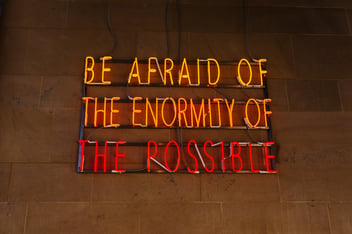No video selected
Select a video type in the sidebar.
We’ve probably all had that boss before. You know, the one who acts like a feudal lord and treats the workplace like their own little fiefdom. They might be condescending or crass or rude. They set unreasonable expectations and are then flabbergasted when those expectations aren’t met. They don’t encourage, they threaten. Rather than build people up, they break them down. They seem to be far more interested in “being the boss” than they are in guiding their team to reaching its fullest potential. This is not leadership, this is megalomania.
True leadership is about so much more than just being in charge. That’s certainly a part of it, but if your idea of leadership is about exercising power, I would invite you to take a closer look at what’s driving those motivations. Effective leadership is about selflessness first. Rather than looking to empower themselves, a great leader looks for a need. They don’t drive for their personal vision, but rather, they identify a need and develop a vision that will serve the need. The vision is not about themselves, it is about the need. A great leader then does nothing more than serve the vision to fulfillment in order to satisfy the need. They encourage and empower their team to take ownership of the vision for themselves. And when the team opts in and takes on the vision as their own, the collective becomes an unstoppable force. Because at the end of the day, leadership is service. Service to the vision, service to the team, service to the greater good.
It’s important to remember that most people look to be led. It’s simply human nature. Drop a hundred people on a deserted island and the first thing they’re going to do is start looking around for the person who’s going to stand up and take charge. It’s an instinct that’s developed over tens of thousands of years. When we lived in tribes on the African savanna, it was crucial for survival to have one person to set the tone, to enforce the rules, to lead the way. It really comes down to a matter of efficiency. It’s simply more effective to have one person calling the shots. Whether it’s a director on a movie set, the CEO of a fortune 500 company, or the captain of a football team, having one person to lead the way usually creates the best outcomes. Show me a group where everyone is a leader and I’ll show you a group that spends all its time bickering about who’s idea is best and getting nothing done. It’s called having too many chefs in the kitchen. But wanting to be led doesn’t mean wanting to be abused. That’s called masochism. Most people are happy to be told what to do, but what they’re really looking for is to be inspired, to be lifted up, to be empowered to take on their role with pride and ownership.
Let’s go back to that deserted island for a minute. Our survivors are frightened and confused. Some will panic, some will simply shut down, some will get to work. There are two types of leaders who will rise. One is the strongman. This person will take charge whether they’ve been asked to or not. They’ll bark out orders, they’ll enforce the rules they’ve decided on, even using force if they deem it necessary. And it may be effective at first, because when people are afraid, strength is comforting. But when the panic has passed, when the basic needs of survival have been met, the strongman becomes vulnerable. Our survivors don’t want to be treated like subjects of the king and the strongman’s motivation becomes retaining his power rather than doing what’s best for the group as a whole. (See Lord of the Flies). The other type of leader doesn’t rise up out of fear or a need to be in charge, but rather because they recognize the need: food, water, shelter. They coordinate with the other survivors to determine who’s best fit to accomplish each task. Rather than leading with brute strength, they inspire and encourage and uplift and they frame the narrative that “we’re all in this together”. Rather than creating a tribe of followers, they actually create more leaders. (See Lost).
Leadership doesn’t come naturally to everyone, but anyone can be a leader. Legendary football coach, Vince Lombardi, said, “Leaders aren’t born, they are made. And they are made just like anything else, through hard work.” You may have heard the first part of that quote before, but it’s the second part that is crucial to understand. Being a “boss” is easy. Anyone can dole out orders and punishments. Leadership requires skill. It requires being attentive, putting vision ahead of personal wants or desires, being able to admit when you’re wrong and pivoting to a new course of action. Leadership is serving those that you lead. It’s about caring for them, mentoring and training them, showing them, by example rather than edict, what it is to lead and what to aspire to. It requires that you get clear and intentional about who you are going to be, and then get busy training those qualities - selflessness, integrity, honor, respect.
It just so happens that training the personality and who we choose to become is exactly what we do in our Power Series. If you aspire to a role of leadership, or if you are already there, we provide the strategies and techniques for honing the skills necessary for being a truly great leader. Find out more about the Power Series HERE. And for those of you who are interested in training at a deeper level and who wish to pay their IMS training forward, the Apprentice Program might be the right fit for you. That’s where we really hone in on the specific qualities of Selflessness, Respect, Integrity and Honor. Click HERE to learn more about the Apprentice Program and keep your eyes open for the next application date!




